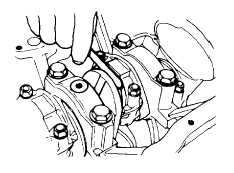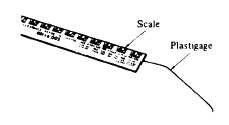| |
TM 10-3930-653-14&P
(2) CONNECTING ROD WEIGHT
When replacing any or all of the connecting rods,
carefully measure their weight to insure that the
difference in weight between individual connecting rods
does not exceed 5 gr (0.18 oz).
Difference in weight between
individual connecting rods
(including metal fasteners):
Within 5 gr (0.18 oz)
(3) MEASURING CONNECTING
ROD END PLAY
Apply the bushing to the connecting rods and install
them on the crankshaft. By pushing the rod to one side,
and using a feeler (thickness) gauge, measure rod
clearance in the shaft (axial) direction against the
crankpin.
Fig. 4-57. Measuring Connecting Rod
Standard
Limit
End play
0.17 to 0.3 (0.0067 to
04 (0.0157)
mm (in)
0.0118)
(4) CONNECTING ROD BUSHINGS
(1) Inspect bushings for binding, fusing, peeling,
contact, etc., and replace if faulty.
(2) Measure lubrication (oil) clearance with a width
gauge (plastigage).
(5) Measuring lubrication
(oil) clearance
(1) Thoroughly clean
all
oil
and
dirt
from
each
component (especially reverse side of bushing) and
install connecting rod bushings.
Fig. 4-58. Plastigage
(2) Cut a width gauge (plastigage) the same width as
the bushing and provide oil clearance parallel to crank
pin. After installing connecting rods, tighten to specified
torque.
Tightening torque:
Connecting rod
10 to 11 kg-m
(72 to 80 ft-lb)
CAUTION:
Do
not
turn
crankshaft
while
plastigage is being inserted.
Fig. 4-59. Measuring Lubrication {(Oil)
Clearance (II)
4 - 35
|





